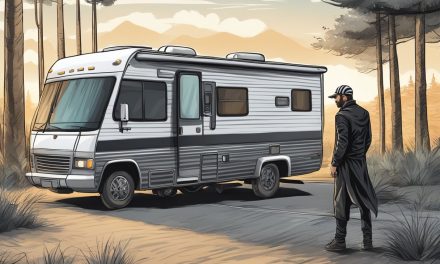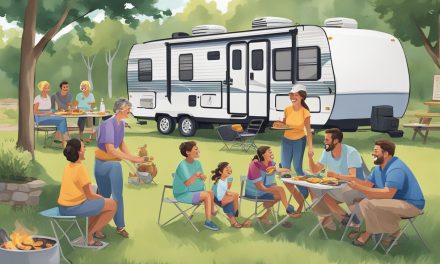You may wonder if owning an RV park can really make you money. Many investors ask, “are rv parks profitable” because these parks have lower startup costs and good rental income. In this blog post, you will learn about campground investment and get simple financial strategies for better business profitability.
Keep reading to see if investing in recreational vehicle parks is right for you.
Understanding the RV Park Business Model
Understanding the RV park business model is key to making smart choices. You can find different ways to earn money, like short stays or long-term rentals.
Investment Potential (ROI, low startup costs, expanding revenue streams)
RV parks offer strong investment potential. You benefit from lower startup costs and strong ROI compared to other real estate types. Multiple revenue streams support long-term profitability.
| Factor | Details |
|---|---|
| ROI | RV parks can bring in higher returns than many traditional investments. Owners often see cap rates between 8% and 12%. These numbers are more attractive than most apartment complexes or storage units. |
| Startup Costs | You can get started for less than with hotels or apartments. Land and basic infrastructure cost less. Maintenance is also cheaper due to fewer buildings. |
| Expanding Revenue Streams | RV parks earn money from nightly, weekly, and monthly site rentals. Extra income comes from offering Wi-Fi, propane, laundry, or storage. Some parks add cabins, glamping tents, or event spaces to boost profits. |
| Market Growth | RV travel surged in the U.S. after 2020. Many travelers now prefer RVs for leisure. This trend increases demand for safe, convenient RV parks. |
| Low Maintenance | Fewer buildings mean less repair work. RV owners care for their own vehicles and many common areas are low-cost to maintain. |
| Diversified Business Models | You can run a simple, low-cost park or upgrade to a luxury site. Both models have profit potential. Long-term rentals attract seasonal workers or snowbirds, while short-term stays pull in travelers. |
| Alternative Investment | RV parks offer a new path for real estate investors. Many buyers look for ways to avoid crowded markets like apartments or single-family homes. |
Would you like to save this article?
Different Business Models (B2C, nightly stays vs. long-term rentals, low-maintenance, luxurious)
The RV park business model has many options. You can choose between different ways to earn money.
- Business-to-Consumer (B2C) focuses on serving campers directly. This model allows you to connect with people looking for a place to stay, creating strong customer bonds.
- Nightly stays offer quick income. Campers often pay for short visits, which can lead to higher occupancy rates, especially during peak seasons.
- Long-term rentals provide steady cash flow. Travelers may want a spot for weeks or months at a time, ensuring consistent revenue.
- Low-maintenance parks attract investors who want less hassle. These parks often require fewer amenities and upkeep, leading to lower costs and more profit.
- Luxurious RV parks cater to high-end customers. They may include extra features like pools and luxury cabins, allowing you to charge higher rates for unique experiences.
- Multiple revenue streams are crucial for success in this market. Aside from rental income, you can offer services like rentals of recreational vehicles or camp supplies, expanding your profit potential.
- Financial analysis is key before starting an RV park investment. Focus on location and offered amenities since these factors influence profitability greatly.
- The hospitality industry is growing; RV parks are part of this trend. Many people are seeking alternative travel options that offer flexibility and comfort while enjoying nature’s beauty.
- Understanding the market carefully helps you make smart decisions about your investment strategy in the campground business.
- Investors should take time to research trends in campground management before diving into this business opportunity for better returns on their investments.
Revenue Generation (Cap Rate, ancillary revenue streams)
Revenue generation is key for RV parks. Cap Rate helps you figure out how much money your investment can make. A higher Cap Rate means better returns. Many RV parks earn income from various sources. You might charge for nightly stays, offer long-term rentals, or even rent out cabins.
Ancillary revenue streams can boost profits as well. Consider selling snacks and drinks or renting bikes and kayaks to guests. Providing extra services like guided tours can also help increase earnings. Understanding these options will enhance your campground management strategy and lead to more rental income opportunities.
Key Considerations for Starting an RV Park
Starting an RV park takes careful thought. You need to find the right spot and know the local laws before you begin.
Selecting the Right Location
Choosing the right location for your RV park is key to success. A great site attracts more visitors, leading to higher rental income. Look for areas near popular attractions like lakes, mountains, or national parks.
Busy highways also help draw in road travelers looking for a place to stay. Understanding market trends can give you an edge. The best spots often have amenities that appeal to guests.
Research local laws and zoning regulations before committing to a location. This will help avoid future legal issues and ensure smooth operations. A good financial analysis includes understanding costs related to the land and development needs such as site development costs.
An ideal spot can greatly boost profitability and enhance guest experiences at your campground investment! Next up is exploring legal considerations when starting an RV park.
Legal Considerations
Starting an RV park means paying attention to legal rules. You need permits and licenses to operate. Every state has different laws for RV parks. Understand zoning laws in your area first.
These laws affect how you can build and run the park. You must also follow safety standards, such as fire codes or health regulations.
Insurance is key too. This protects your investment from accidents or damages. Liability insurance will keep you safe if someone gets hurt on your property. Knowing these legal factors is crucial for success in the campground investment space.
They impact profitability directly by helping avoid fines and interruptions in service.
Estimating Costs
Estimating costs is key for your RV park investment. You need to think about many expenses. Start with land costs. This can vary by location and size. It’s wise to research local prices.
Next, consider construction and maintenance fees. RV parks often have lower startup costs than other real estate options. You can build basic amenities or go for luxurious ones, depending on your budget.
Utilities are another cost to factor in—water, electricity, and sewage must be included in your plan.
Marketing also plays a big role in estimating costs. Advertising will help attract visitors to your campground investment. Plan for these expenses carefully to ensure good rental income from every site you offer at the park.
Hiring Staff
Starting an RV park means you need a good team. Hiring staff is key to keeping your park running smoothly.
- Define job roles clearly. Each position needs specific tasks and responsibilities. This helps your staff know what to do.
- Look for experience. Staff with experience in hospitality or property management can boost your RV park’s success. They understand the needs of guests.
- Train new hires well. Proper training ensures they can handle emergencies and guest requests efficiently. It builds a strong support system for your park.
- Offer good customer service skills training. Your staff will be the face of the park, so they should interact positively with guests every day.
- Plan staffing levels carefully. Determine how many employees you need based on busy seasons and peak times, ensuring efficient operations during high-demand periods.
- Promote a positive work environment. Happy staff provide better service, which leads to happier guests, increasing your rental income.
- Use technology for scheduling and communication tools among staff members; this improves efficiency and effectiveness in maintaining RV operations.
- Keep evaluating staff performance regularly; give feedback and recognition for their hard work to motivate them further.
- Focus on hiring seasonal staff during peak months; this reduces costs while ensuring enough coverage when guest numbers rise significantly.
- Clearly outline pay scales based on local standards; offering competitive wages attracts talented workers who will help grow your business profitability over time.
Advertising & Marketing
Hiring staff is a vital step in running your RV park. Once you’ve built your team, focus on advertising and marketing to draw in guests. Effective marketing can boost your campground investment significantly.
Start by using online platforms. Create a website that showcases your amenities, location, and rates. Use social media to share photos and updates about events at the park. Consider offering special deals for long-term rentals or families.
This strategy can lead to multiple revenue streams, enhancing rental income from visitors looking for quality tourist accommodation. Keep track of what works best through financial analysis of guest preferences to maximize profits efficiently.
Funding Strategies for RV Park Investments
Finding the right funding for your RV park can make a big difference. You have options like bank loans, private investors, and other ways to bring in money.
Bank Loans & SBA Loans
You can fund your RV park investment with bank loans or SBA loans. These options help you manage costs and grow your business.
- Bank loans provide a straightforward way to get the money you need. Banks offer different types of loans for real estate investments, including RV parks.
- Interest rates on bank loans can vary based on your credit score and financial history. A good credit score may lead to lower rates, reducing overall borrowing costs.
- The Small Business Administration (SBA) offers special loan programs for small businesses, including RV parks. These loans often have favorable terms, making them attractive for new investors.
- With SBA loans, you might need to meet specific eligibility requirements. This includes having a solid business plan that shows how you will generate rental income from the park.
- Both loan types require you to show proof of cash flow from your park. This financial analysis helps lenders understand your income and expenses better.
- You should research local banks and SBA loan options before deciding where to apply. Different lenders may offer varying terms that can impact profitability in the long run.
- Applying for bank or SBA loans can take time, so start early in your planning process for RV park development in the U.S.. You want funding ready when you’re prepared to launch or expand your park.
- Seek advice from experienced investors or financial advisors when exploring loan options. This guidance can help maximize profits and manage expenses effectively as you invest in recreational vehicle parks.
- Consider creating a detailed budget that includes startup costs and ongoing expenses related to campground management; this will strengthen your loan application significantly.
- Success in securing funding often depends on how well you understand the market dynamics of RV parks; knowledge about location, amenities, and tourist accommodation trends is key for attracting private investors too.
Private Investors
Private investors can be a great resource for RV park investments. They are often looking for profitable projects. These investors may provide the funds you need to start or expand your RV park.
Their support can help cover startup costs and other expenses.
Many private investors understand the potential of recreational vehicle parks. They see that these parks offer competitive ROI due to lower construction and maintenance costs compared to traditional real estate.
By attracting private money, you increase your chances of success in this business venture.
Additional Revenue Streams
RV parks can make money in many ways. Investors should explore these additional revenue streams to boost their income.
- Offer RV rentals. You can provide RVs for guests who do not own one. This service attracts more visitors and increases rental income.
- Sell camping supplies and gear. A small store at your park can sell items like firewood, snacks, or games. This adds convenience for guests and increases profits.
- Provide guided tours or activities. Offer local tours, hiking trips, or fishing outings for guests to enjoy. They are usually willing to pay for a unique experience.
- Set up a dump station for waste disposal services. Charge a fee for non-guests needing this service. This offers an essential need and generates extra income.
- Create event spaces for gatherings or parties. You can rent out areas for family reunions, weddings, or corporate events. This diversifies your income sources significantly.
- Build cabins or glamping tents on site. These accommodations attract more visitors who prefer more comfort than traditional camping provides.
- Host seasonal events or festivals at your park location. Events like music festivals or holiday celebrations draw crowds and increase overnight stays.
- Add amenities such as pools or playgrounds with fees attached for use by non-staying families nearby; this enhances the guest experience while generating extra revenue.
- Partner with local businesses to offer packages that include discounts on attractions in the area; you earn commissions while promoting tourism around your park.
- Create loyalty programs offering rewards for repeat customers; they will return often because of perceived value while increasing your overall rental income strategy.
These ideas help maximize profits in the RV park business while providing enjoyable experiences for guests visiting your campground investment property.
Maximizing Profits in the RV Park Business
To boost profits in the RV park business, use a good property management system for better bookings and customer service. Discover how to maximize your income and improve guest experiences by reading more!
Utilizing an RV Park Property Management System
An RV park property management system helps you run your business more smoothly. It can keep track of bookings, payments, and customer information. This makes it easier for you to manage income and expenses effectively.
By using a system, you save time and reduce errors.
A good management tool also boosts customer satisfaction. Guests appreciate easy online reservations and quick check-ins. The right technology can help improve your RV park’s profitability by streamlining operations.
With these systems, you can focus on growing rental income and expanding your investment in recreational vehicle parks.
The Importance of Marketing and Reservation Management
Marketing is crucial for RV parks. Good marketing helps attract more visitors. Use social media, websites, and ads to reach potential guests. Highlight what makes your park special.
Show off amenities like Wi-Fi, pools, or picnic areas.
Reservation management also plays a key role in profitability. An efficient system keeps track of bookings and guest information. It reduces double bookings and errors. This way, you can focus on providing great service while maximizing rental income.
Proper marketing and reservation management can lead to higher profits in the RV park business.
Accessing Funding for Expansion
Accessing funding is key for expanding your RV park. Bank loans and SBA loans can provide the cash you need. These options often have lower interest rates than private investors. You can also seek private investors who might want a share of your profits in exchange for their money.
Adding more amenities or services can help you bring in more revenue. Consider offering recreational vehicle rentals to attract tourists. This strategy adds to rental income and enhances guest experience, making your park more appealing.
Understanding these financial strategies will help you grow your campground investment effectively.
Trends and Potential Investment Returns in the RV Park Industry
Expanding the RV park business can lead to interesting trends and solid investment returns. You may see a rise in demand as more people choose to travel with RVs. Many families prefer outdoor vacations, which boosts the popularity of campgrounds.
This trend shows that investing in recreational vehicle parks can be smart.
Cost efficiency plays a big role too. RV parks often have lower construction and maintenance costs than traditional real estate. A good financial analysis reveals their potential for strong rental income and diverse revenue streams.
If you are looking for alternative real estate investments, consider campground management as an option for earning passive income with great investment opportunities.
Successful RV Park Case Studies
The RV park industry shows promise for investors. Many parks have thrived by using smart strategies.
- A park in Texas tripled its income by adding cabins for rent. This attracted families who prefer more comfort than tents or RVs offer.
- One California RV park focused on luxury camping. They added high-end amenities like hot tubs and gourmet food options, which drew in a wealthy clientele.
- An RV park in Florida saw success by hosting events. Live music nights and craft fairs brought in locals and tourists alike, increasing weekend traffic.
- Another park in Oregon used eco-friendly methods to attract visitors who care about the environment. They installed solar panels and built nature trails, making it a popular spot for eco-conscious travelers.
- A park in Arizona used social media to reach potential guests effectively. Engaging posts and photos highlighted their beautiful scenery, boosting reservations significantly.
- A North Carolina RV park partnered with local businesses for discounts on activities nearby. Guests enjoyed lower rates while supporting community shops, making the area more appealing to visitors.
- One RV park improved its reservation system with advanced tech tools. Streamlined booking increased efficiency and made it easier for customers to plan their trips.
These cases demonstrate how creative strategies can boost profits in the campground investment space and show that properly managed parks can thrive as profitable assets in real estate investment ventures.
Conclusion
RV parks can be a smart investment for you. They offer low costs and good returns. Many ways to earn money exist in this business. By choosing the right location and understanding your market, you can thrive.
If you plan well, RV parks can provide steady income while being fun to manage.







